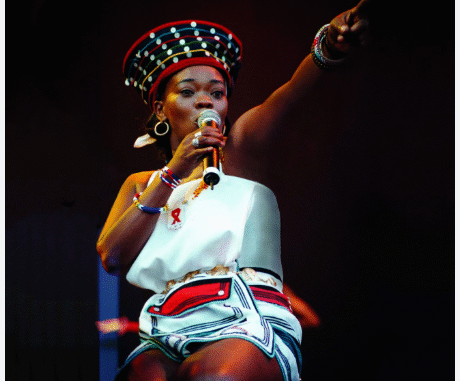
Brenda Fassie was a South African singer and songwriter. She was known as the “Queen of African Pop.” Her music blended Afropop, township jive (mbaqanga), and disco. Her voice was powerful, emotional, and full of energy. She was more than an entertainer. She gave a voice to everyday South Africans.
Early Life
Brenda Fassie was born in 1964 in Langa, Cape Town, South Africa. She grew up in a township and faced poverty early. Her mother worked hard to support her family. Brenda started singing in church and school competitions. Music became her way to express emotion and survive hardships.
Musical Beginnings
In the 1980s, Brenda joined the group “Joy”, performing local hits. She later formed her solo career.
Her first solo album, “Weekend Special” (1983), became a hit across South Africa. She quickly became famous for her energetic performances and relatable lyrics.
Major Albums
-
Weekend Special (1983) – First major hit; Afropop and township jive.
-
Too Late for Mama (1985) – Emotional songs about love and struggle.
-
Black President (1988) – Political and socially conscious album.
-
Brenda (1990) – Pop and dance tracks; cemented her fame.
-
Mama (1992) – Focused on African identity and empowerment.
-
Now Is the Time (1996) – Mature sound; addressed personal and social issues.
-
Naked (2002) – Final studio album; celebrated freedom and life.
Weekend Special (1983)
This album made her a household name. The title track became an anthem in South Africa. It mixed mbaqanga and Afropop with catchy rhythms.
Black President (1988)
A politically charged album. The title track honored Nelson Mandela during his imprisonment. It showed Brenda’s courage and connection to the anti-apartheid movement.
Mama (1992)
Celebrated African women and township life. The songs mixed danceable beats with meaningful lyrics.
What Made Her Different
-
Bold and expressive voice.
-
Mixed Afropop, disco, and township jive.
-
Songs reflected life in South Africa, love, struggle, and politics.
-
Energetic live performances.
-
Fearless in addressing social and political issues.
She didn’t follow trends. She set them.
Who Listened to Her
-
Township communities and urban South Africans.
-
Fans of African pop and mbaqanga.
-
Listeners who enjoyed danceable yet meaningful music.
-
Youth looking for songs about love, freedom, and life struggles.
Her audience loved her honesty and energy.
Collaborations
Brenda Fassie worked with:
-
Yvonne Chaka Chaka – fellow South African pop star.
-
Ladysmith Black Mambazo – collaborative performances.
-
Local producers shaping Afropop in the 1980s and 1990s.
Even in collaborations, her voice remained dominant and vibrant.
Activism and Cultural Impact
She gave a voice to the voiceless through her songs. Songs like “Black President” carried political messages. She represented township culture and African identity on global stages. Her life reflected South African struggles and triumphs.
Later Years and Legacy
Brenda Fassie continued performing until her death. She died in 2004 at age 39. Her music remains popular across Africa.
Legacy highlights:
-
Queen of African Pop and township jive.
-
Voice for South Africans during apartheid and post-apartheid.
-
Influenced modern Afropop artists.
-
Her songs remain danceable, emotional, and socially relevant.
Words
Brenda Fassie was more than a singer. She was a South African icon. Her music combined energy, emotion, and social awareness. It captured township life, love, and the fight for freedom.
For anyone exploring African pop, Afropop, or township jive, Brenda Fassie is essential listening.
Leave a Reply